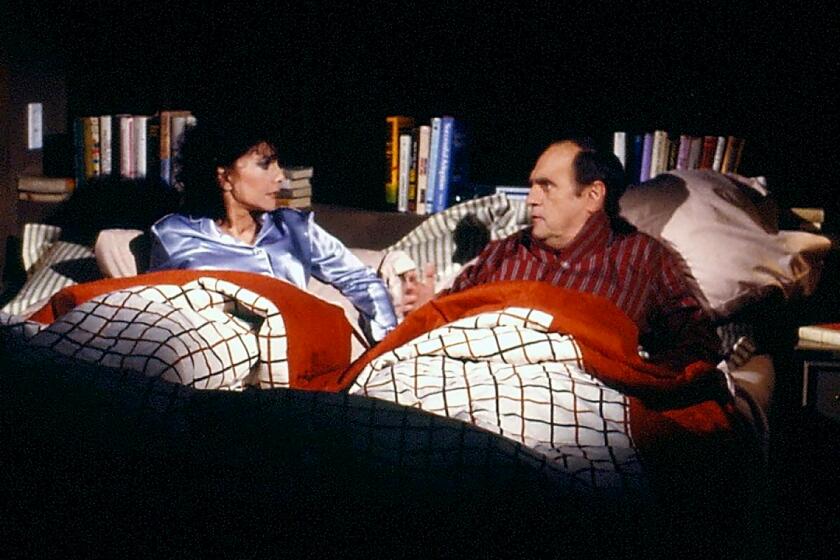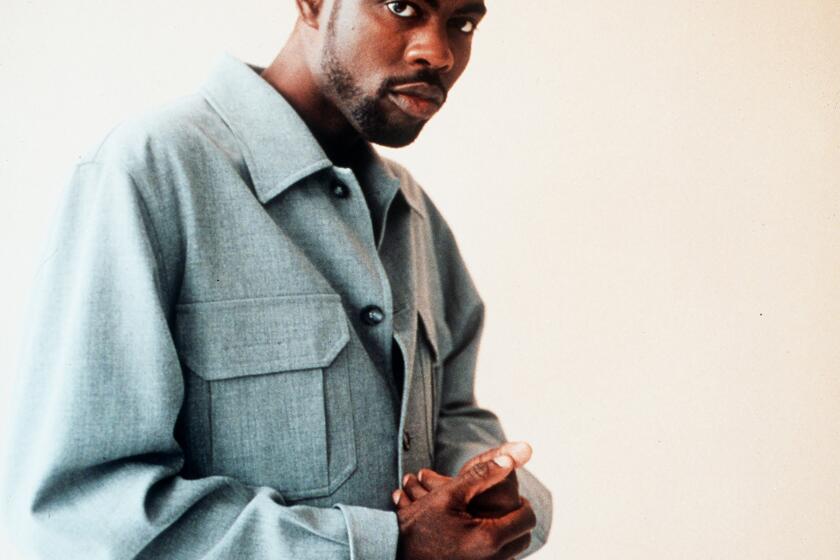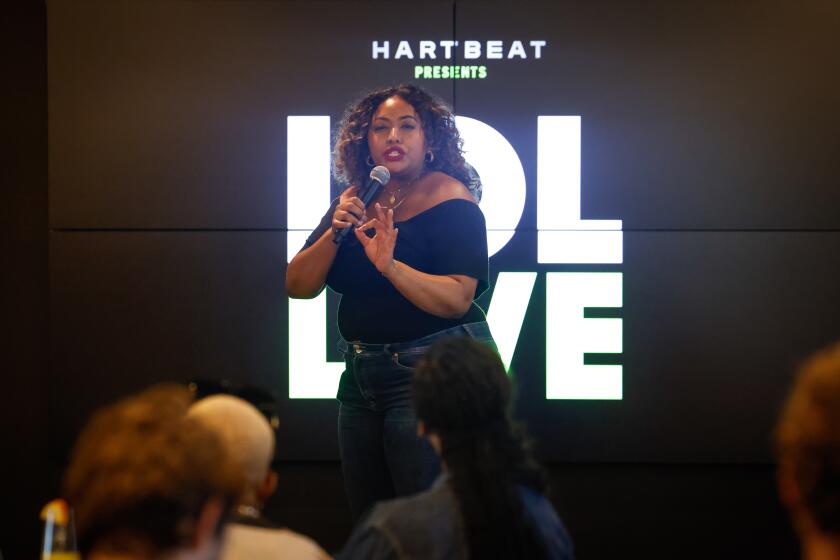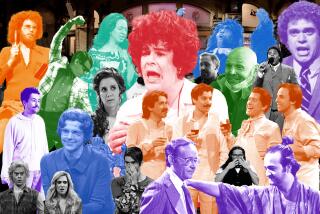Groundlings alumni look back at 50 years of laugh-out-loud history in sketch comedy
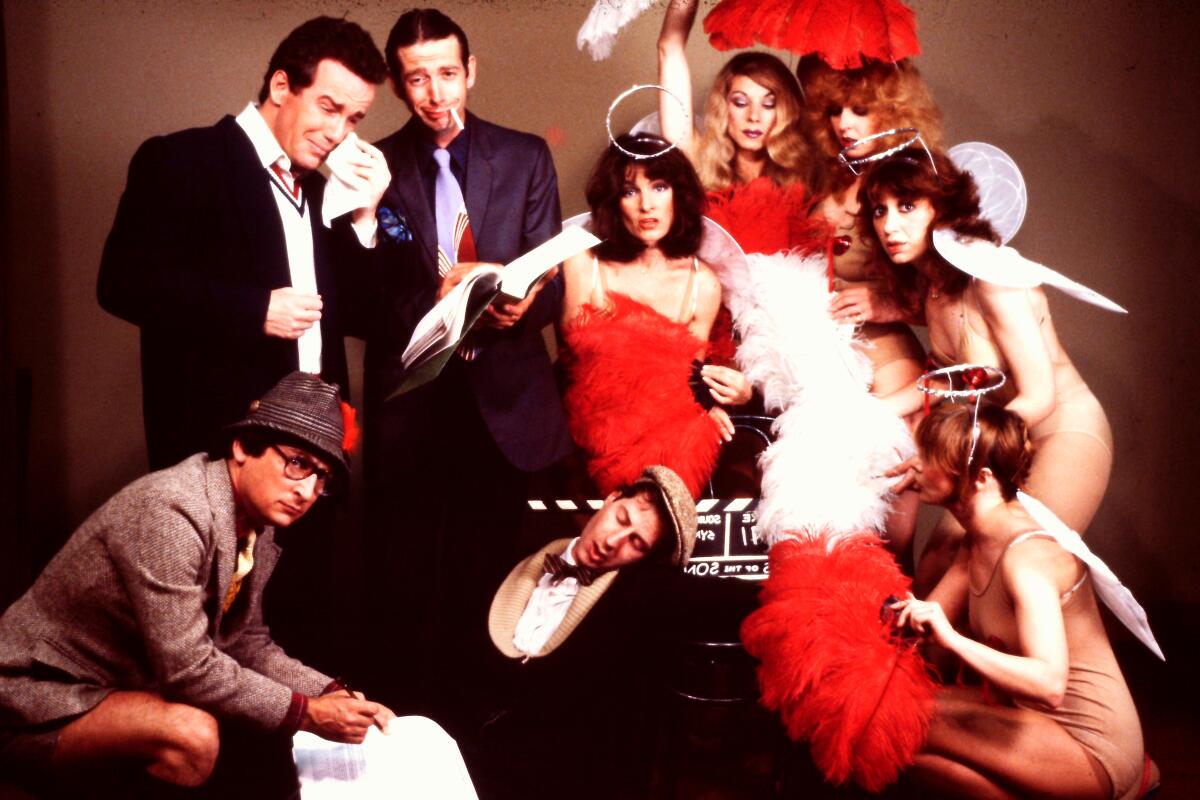
In the last 50 years, the world of sketch comedy and improv have benefited from the funny footprint of the Groundlings. The list of stand-up, Hollywood and late-night TV legends who started their careers in the ranks of the Los Angeles ensemble is a testament to its innovation — so much so that some of their biggest fans hail from Chicago’s famed counterpart, Second City.
The division, explains Laraine Newman, a “Saturday Night Live” veteran and original Groundlings member, is clear: “Second City was basically premise-driven, and the Groundlings is character-driven.”
For the record:
6:28 p.m. Aug. 6, 2024This article originally misspelled Cheri Oteri’s name as “Sheri Oteri”
Originally founded in 1974 by Gary Austin as an improv workshop, the Groundlings has continued, in the words of actor and improvisor Bob Odenkirk, “their inspired silliness” for five decades.
Odenkirk, an alum of Second City, said he carries a profound respect for his L.A. comedy counterparts. “I was mad at the Groundlings for breaking the rules, but also for being so f—ing funny. There’s something to be said for the two different schools. In the end, my heart is a little bit more with the Groundlings and the freedom to be ‘silly funny.’ I love silliness. Especially now.”
From Phil Hartman and Paul Reubens to “Romy and Michele’s High School Reunion” and “Bridesmaids,” plus every “Saturday Night Live” season in between, the theater and Groundlings school on Melrose Avenue in Hollywood have continued building an original, rule-breaking, wholly local comedy education.
The true impact, former student and instructor Lisa Kudrow insists, comes in the real world. “Really listening, really giving the other person the benefit of the doubt that they know what they’re doing, that’s really important,” she says. “Maybe everyone needs to take an improv class.”
2024 celebratory highlights have included live “Multiple Talking Women” podcasts with special guests Kristen Wiig and Kathryn Hahn, plus a panel series welcoming Kathy Griffin, Ana Gasteyer, Wendi McLendon-Covey, Tim Bagley and Julia Sweeney. The theater held a “Pee-wee’s Playhouse” reunion tribute July 22. Tonight’s “50th Anniversary: The Alumni Show” stars Maya Rudolph, Cheryl Hines, Oscar Nunez and more.
With additional programming on the way, five decades of Groundlings women discuss the laugh-out-loud history of one of L.A.’s greatest comedy institutions.
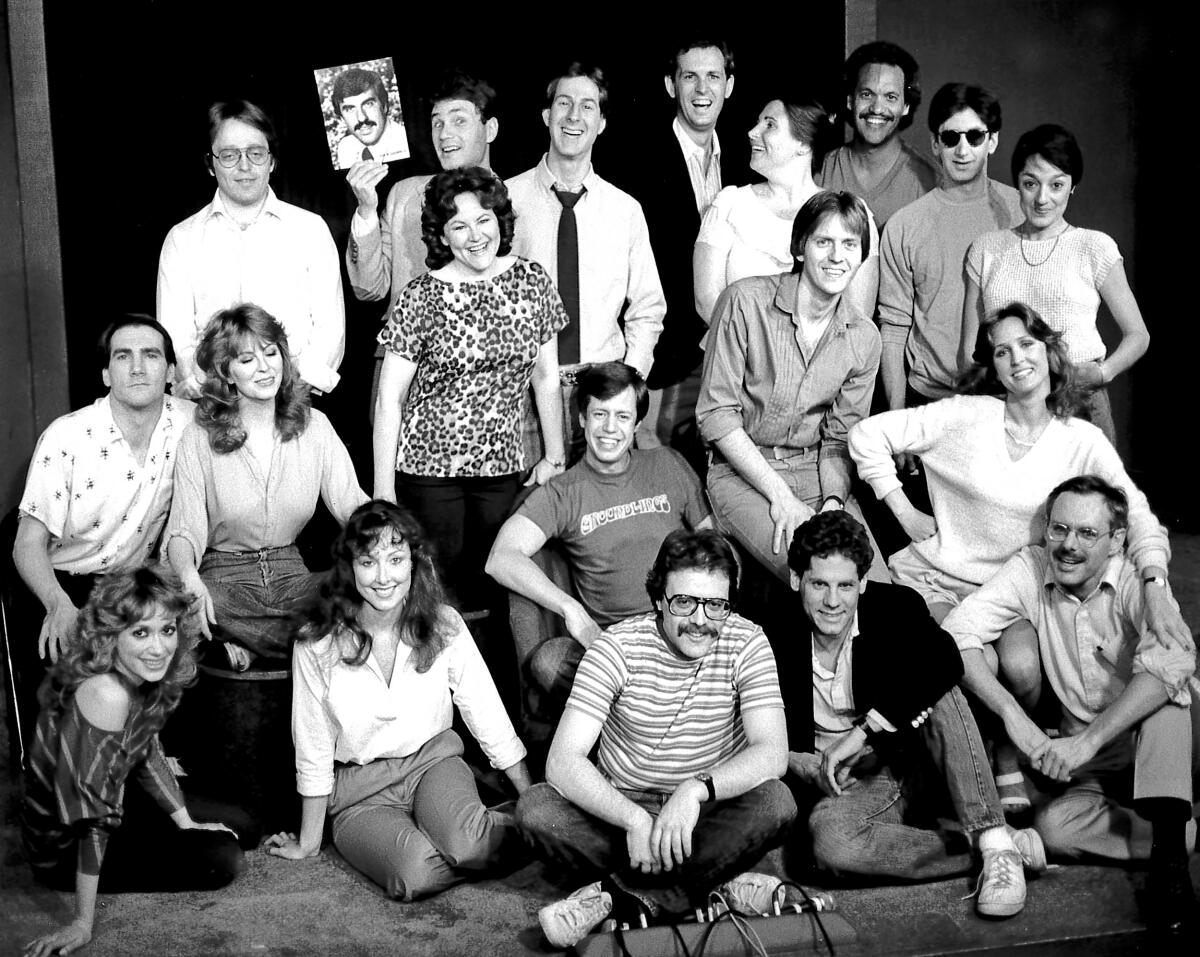
How did you realize the Groundlings was a community you belonged in?
Tracy Newman: I think I saw it on a bulletin board somewhere, or maybe somebody suggested that I go to this. It was people like Tim Matheson, Craig Nelson, Pat Morita, Valerie Curtin and Archie Hahn. Gary had this dream to start a company that was run by the actors, because he’d been in groups like the Committee. He thought it would be better if the actors were in charge, which is the makeup of the Groundlings, as a nonprofit.
Laraine Newman: Tracy has been the ground zero for many of the good things that happened in my life. I was at Cal Arts in a theater program, which wasn’t really the right fit, but I didn’t understand why. She would listen to me complaining about the program, and said, “I’m in this workshop; why don’t you come and join this?”
Tracy Newman: I dragged her to the class at the Cellar Theater, and she was pretty amazing right off the bat. I knew she did characters, but I didn’t know the extent of it, and I had never seen her on stage.
Laraine Newman: The Granville is where we decided the name the Groundlings. There were two possible names, one being the Working Class, which I thought was ever so clever, and the Groundlings, which I thought we’d outgrow. I was worried it would make us sound like a bunch of hippies, which we were. So I of course voted against the Groundlings.
Tracy Newman: The street was called Granville, and we were in, I think, a furniture warehouse in West L.A. At that time, if you were interested in being in the Groundlings, all you had to do was audition. If you weren’t crazy, and willing to pay $30 or $40 a month, you got in. We were there for a couple months, then we moved to the Oxford Theater, where we stayed for a couple of years.
Laraine Newman: We were so fledgling at that point. But it was an exciting time in Los Angeles. It was the beginning of the comedy boom, even though it’s been ascribed to several decades. I observed it starting in the ‘70s. There were so many sketches we did at the Oxford. We did the “Miss Groundlings” pageant. I did “Famous Bridges” because I was really limber and I could get on my hands and feet backwards and form different bridges. That was my talent.
Tracy Newman: Then we rented the Groundling space where it is now, but we couldn’t open because we didn’t have the permits. That took four years or something. We were doing shows at the Improv or the place called the White House, or other venues. The theater didn’t open until ‘79.
Laraine Newman: By the time we moved to Melrose, I had already gone to “SNL.” Nobody there had heard of the Groundlings, and I got endless teasing from Chevy Chase and Dan Aykroyd. John Belushi was like, “What’s that group you’re from, the Groundhogs?”
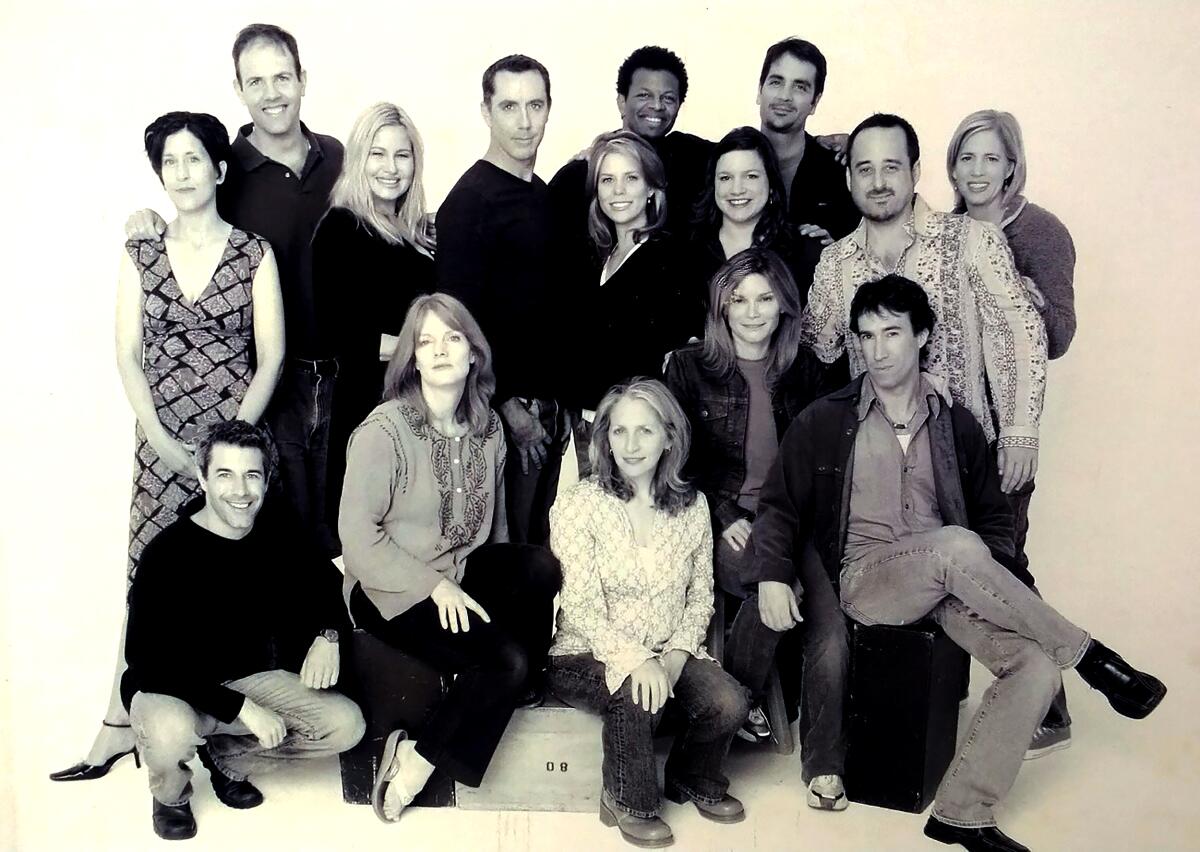
Lisa Kudrow: I grew up with my brother’s best friend, Jon Lovitz. The summer I graduated college is when he got into “Saturday Night Live.” I told him, “I think I want to give acting a try.” And he said, “Great, go to the Groundlings. I was a theater major in college. I’ve taken a lot of acting classes. The place I learned the most useful tools was at the Groundlings. So go there and take those classes and see what happens.” It was the only game in town in terms of sketch comedy and improvisation. I felt like, “I think I need to be a comedic actor. I really can’t see myself in an acting class with a bunch of brooding introspection.” I called just to take classes, and the person on the phone said, “When’s the last time you performed?” I said, “Oh, junior high!” “Well we’re going to send you to a teacher named Cynthia Szigeti, and you’ll do that for a while, then you can come audition for our classes.”
Kristen Wiig: I don’t even know what year it was. I think it was Jennifer Coolidge and Mike Hitchcock, a Main Stage show where they had sketches and improv. I had never seen improv before. I was a huge “SNL” fan and I loved comedy, but I’d never decided to start going down that road. I was like, “I want to do that! That looks like so much fun!” There’s something that’s so infectious about seeing shows there, is that people are genuinely having fun and making each other laugh.
Michaela Watkins: I went for a hike with a friend that I knew from high school. She told me about the Groundlings. I was classically trained, doing Shakespeare and Moliere and all that crap at the time. I started in the school, and then I kept going, going, going, and then I became a Groundling. And from there “SNL” and everything else kind of unfolded. So Groundlings is my everything, really. Genuinely my friend circle; all the breakups that you go through when you’re coming of age. When I say coming of age, I mean 30 to 40. This is my community. And everywhere I’ve been since here, you’re always looking for that same kind of “I got your back” vibes that you have here. This is my family.
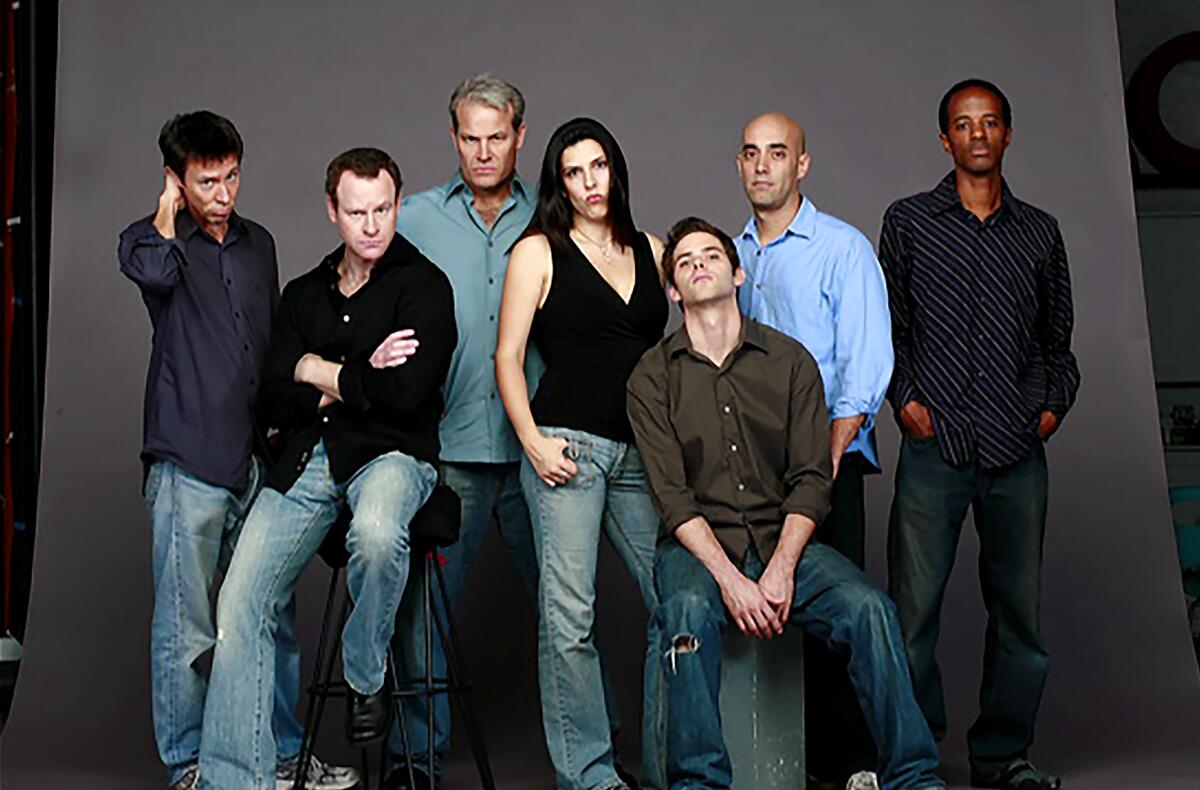
What sorts of memories does Groundlings’ Melrose location evoke?
Wiig: In that building, I’ve never been more nervous. I’ve never had more fun. It changed my life in so many ways, whether it’s taking classes or writing a sketch for the first time, performing a monologue for the first time, doing improv for the first time. Being terrified to do something, and then doing it. Also a really big thing for me are the people that I met there. I’m still very, very good friends with a lot of people that I came up with. It holds such a huge place in my heart.
Melissa McCarthy: One of my most special Groundlings moments is the day I met [husband] Ben [Falcone]. We were in a class, and he was doing a monologue of an incredibly creepy inmate who was talking to his new cellmate in a whispered tone. Very dark and strange, and I thought to myself, “I like this guy… a lot!” The Groundlings always championed letting everyone’s freak flag fly. I had found my people.
Kudrow: For me, just walking into that building was, “Huh?!”? Laraine Newman was a Groundling! She was my favorite on “Saturday Night Live,” so it was that. Period, end of story. And then her sister, Tracy Newman, who’s a phenomenal writer, was teaching. She was unbelievably great. I was so lucky. It was before she started writing sitcoms with Jonathan Stark, who’s a phenomenal improviser.
Tracy Newman: I left around 1985, so I saw John Lutz, Kathy Griffin, Lisa Kudrow, Conan O’Brien. Also Julia Sweeney, who I adored.
Kudrow: There was another Groundling, Robin Schiff, who had written a play, “Ladies Room.” They needed to hold backers’ auditions to get funding. They were asking teachers, “Who looks promising?” Tracy Newman recommended that I audition for the backers’ audition. It was my first audition ever, and I got it! The character’s name was Airhead No 2. The backers liked it and funded the play, and I was cast in the play as Airhead No 2. It was me and another girl who was Airhead No 1. But now they had names, and they were Romy and Michele. That was my first audition, my first play, and my first professional character.
Watkins: While it’s deeply discouraged that you don’t break on stage, I wish there was a blooper reel of all the times that we all lost it. Because it’s the funniest people in town, literally, you’re on stage with. And they will surprise you constantly. Every single person would tell you of a time they accidentally wet their pants on stage. I had a pretty strong pelvic floor, and they still got me good. What’s worse, that you just wet your pants, or that you had not just had the best belly laugh you’ve ever had in your entire life?
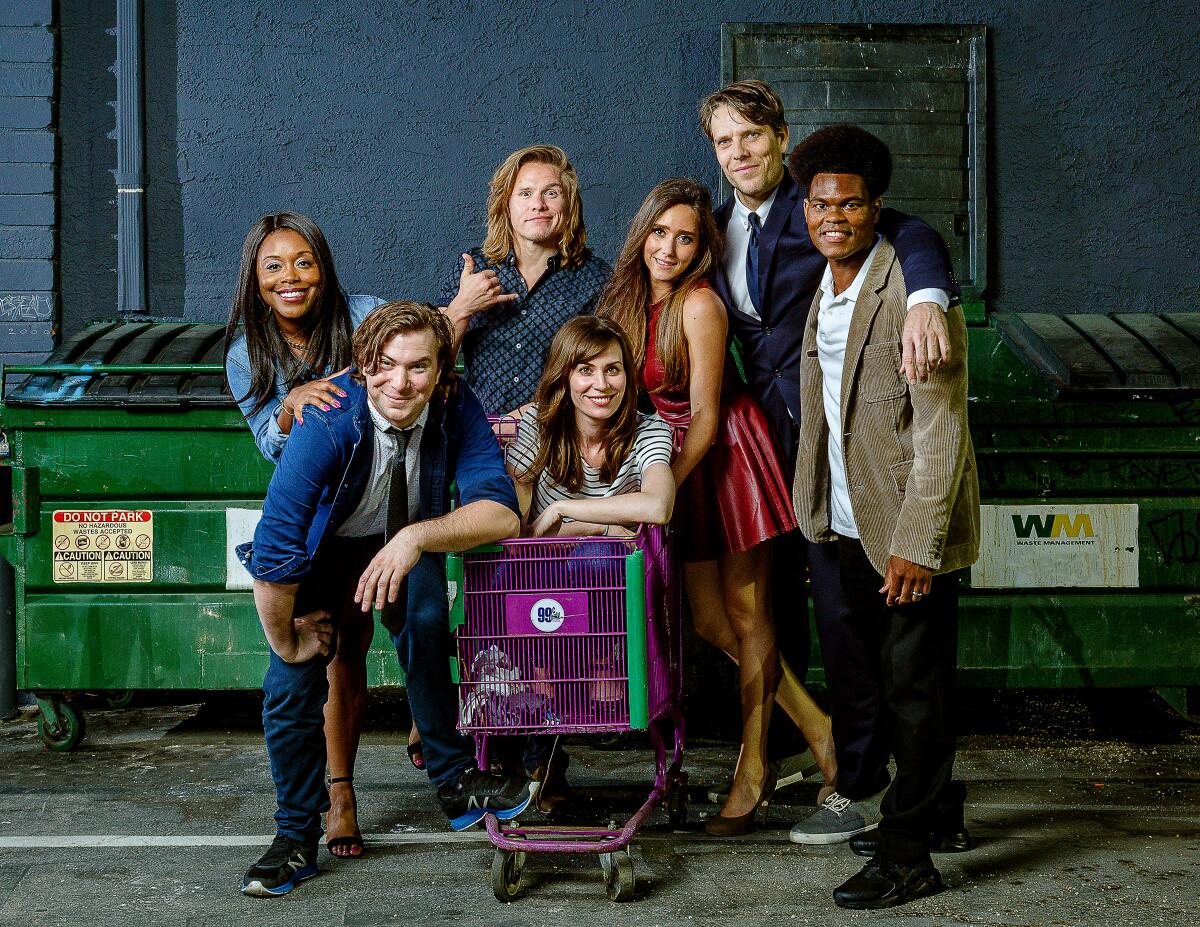
What are the tenets of comedy performance that a Groundlings education instills?
Laraine Newman: Second City was basically premise-driven, and the Groundlings is character-driven. We all start out with the basic Viola Spolin games. What the Groundlings have done is created entirely new games that help with character development. I don’t think there was any school of any kind that ever taught you how to create a character and how to write for it. I think that characters are very enduring. You see by the people that become iconic, like Kristen Wiig and Will Ferrell and Sheri Oteri and Maya Rudolph and Melissa McCarthy, their training was getting the jokes through that character’s behavior.
Watkins: You cannot be self-conscious and be doing Groundling sketches. Groundlings is really unique in their training, in the sense that you are 100% fully committed to your characters all the time.
Tracy Newman: You need a safe place where you’re supported, and at the same time, you can make a lot of mistakes and a fool of yourself and be embarrassed and still survive. A place where you can commit to being something that may not be successful and fail miserably in front of your peers who you admire. And come out of it unscathed and ready to do it again.
Kudrow: You really have to listen, and then you really have to just respond. Don’t worry at first if it’s funny or not. Those are basic tools: listening and responding. The other rule was “No judgment.” Anything your scene partner says is right. You have to affirm whatever it is they’re saying, and add on to it. That was a fantastic worldview to adopt and take into every other area of my life. Really listening, really giving the other person the benefit of the doubt that they know what they’re doing. That’s really important. Maybe everyone needs to take an improv class.
Wiig: It’s about the beauty of collaborating and making your partner look good, helping make a great scene. Being a team player, writing with people and coming up with a sketch or improv with other actors is what I think drives a lot of comedy.
Kudrow: You got $90 a class. Yeah, I did it to make money. The teacher who trained me was Kathy Griffin. I couldn’t believe you’re allowed to teach so snarky! But we got along, and we were friends. She’s also hilarious. I was floored by how nurturing she was as a teacher. She always could see what was good about what somebody did in a scene or in an exercise. Not what’s “bad.” It’s what “needs work.” So it’s starting with, “You’re all good. You all have that potential.”
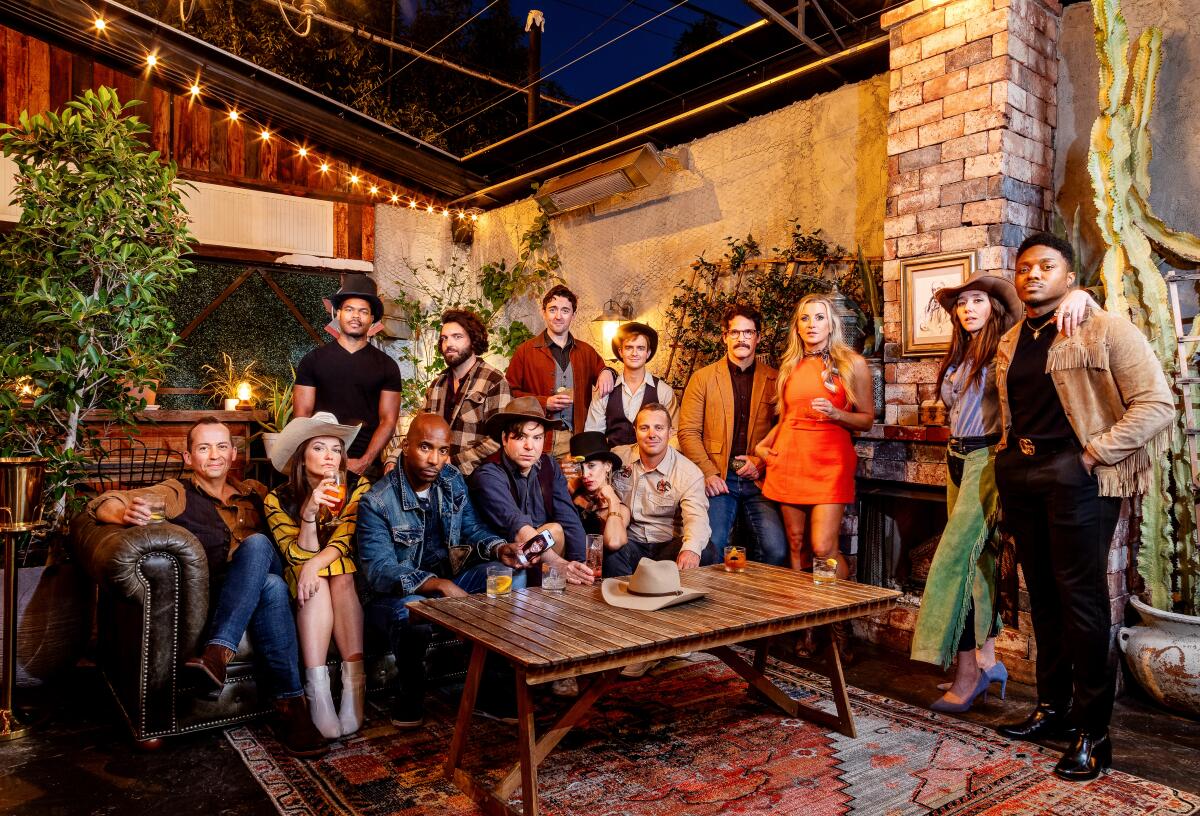
Comedy evolves. What does it mean for an institution like the Groundlings to continue for 50 years?
Watkins: If you’re a good comedian, you’re going to adapt. The audience is going to tell you what they think is funny. And Groundlings, we’re not in it for the cheap laugh.
McCarthy: Standing the test of time is impressive in any field, but in comedy it’s almost impossible. The Groundlings is always pushing the goal forward — or whatever that sports reference is.
Kudrow: It means that they’re doing things right. Their classes are in general really useful and helpful to people in all walks of life, not just actors. It also means that as impossible as it seems when you’re there — it feels like, “Ooh, there’s bitterness, passive aggressiveness, and is that sabotage?” — the Groundlings is allowing you to grow and find your voice.
Tracy Newman: It’s lasted this long because of that passion, the structure, and the nonprofit status. And you can’t discount “Saturday Night Live.” That Lorne [Michaels] himself or his representatives come to shows, just the knowledge that you’re probably going to get to audition for “Saturday Night Live” if you’re in the Main Show, is a huge draw.
Laraine Newman: To be the farm team for something like “SNL,” that is pretty much the pinnacle. We’re introduced to styles and voices that we would never have seen had it not been for that show, Fred Armison or Sarah Sherman or Andy Samberg.
Wiig: Ultimately there’s something comforting knowing what you’re going to get. You’re going to go into that theater, you’re going to laugh, you’re going to have a good time, and watch people have a good time. I don’t know a better thing to do on a Wednesday night than go with your friends to see other friends making you laugh, making each other laugh. The energy fills that theater. There’s been so much laughter there that you just can feel it when you walk in the doors.
Laraine Newman: We have this tradition, that has now become an institution, which still boggles my mind. It was homegrown, and it came together through the dedication and hard work of a lot of people, many of whom are natives. My kids are third-generation Los Angelenos, and I’m very proud that we have something that is 100% lineage from Los Angeles.
More to Read
The biggest entertainment stories
Get our big stories about Hollywood, film, television, music, arts, culture and more right in your inbox as soon as they publish.
You may occasionally receive promotional content from the Los Angeles Times.
